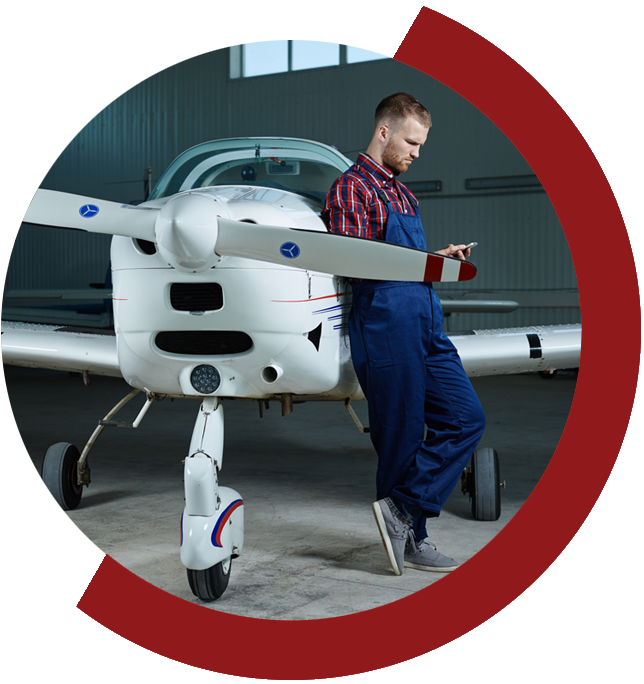Types of Practical Know Abouts Provided:
1. Familiarisation in various functional aircraft placed at various campuses of Sha-Shib Group of Institutions/ associated organisations running AME Training under CAR 147 Basic (Duration -1 Week for each selected Aircraft)
Aerospace Tutorials has access to more than 24 Functional Aircraft placed at various training institutions & related organisations. Familiarisation with such kind of functional aircraft (Opted by the applicants of their choice & availability) is an unwavering foundational step which helps students to develop a strong understanding of aircraft and their systems, which is very fruitful for their future roles as aviation technocrats or aviation personal working in support departments of manufacturing/maintenance/ Operation. Additionally, this hands-on experience helps ensure that students are well-acquainted with a particular type of aircraft in the aviation industry.
2. Industrial Training (Duration - 6 weeks)
Industrial training is a vital component of an engineering student's education. MRO Asia in association with reputed Aircraft Maintenance Organisations which are approved by DGCA, Ministry of Civil Aviation, Govt. of India under regulations in force, facilitates the industrial training of the aspiring candidates in the actual working environment of Aircraft/Aircraft Engine/Aircraft Components maintenance.
3. On-Job Training /Internship Training (Duration - 6 Months)
On-the-job training (OJT) or Internship training has been designed to facilitate experiential learning where individuals, including engineering students, acquire practical skills and knowledge while working in a real-world professional environment. During OJT/Internship Training, participants mandatorily work under the guidance and supervision of experienced professionals as per the rules. Mentors provide support, answer questions, and help trainees develop their skills.
4. Workshop Practical/Hands-on Experience Program (Duration - 1 Week)
Our Aviation-related workshops/Hands-on Experience Program provides practical, hands-on training that can help aspiring students strengthen skills and deepen their knowledge in specific areas of aviation technology. Our workshops are tailored to provide specialised training in required areas which are designed as per the needs of the industry.
5. Training under DGCA-approved CAMOS/Quality Assurance Departments/Stores of approved MROS (Duration - As required by the Applicant)
Working under DGCA (Directorate General of Civil Aviation) approved CAMOS (Continuing Airworthiness Management Organizations), Quality Assurance departments, or Stores of approved MROS (Maintenance, Repair, and Overhaul organizations) is a valuable experience in the aviation industry. These organizations play a crucial role in ensuring the safety, airworthiness, and regulatory compliance of aircraft. Experience in DGCA-approved organizations is recognized nationally & internationally, enhancing career prospects for those interested in working in aviation on a global scale in related roles.
6. Maintenance Experience on Operating Aircraft/Its Engine or Components In MROS
These trainings are imparted within different types of maintenance organisations (CAR-145, M.A. Subpart F etc.) approved by DGCA, Ministry of Civil Aviation(Govt. of India) or under the supervision of independent certifying staff. Maintenance experience in operating aircraft, engines, or components in MROS is an essential and rewarding component in the aviation industry, especially for the candidates aspiring to obtain Aircraft Maintenance Engineer's Licence. Under this setting, we provide hands-on experience, opportunities for specialization, and the chance to contribute to aviation safety and reliability.
Definition and Importance of Maintenance Experience:
Maintenance Experience as per the AMC 66.A.30 (a) Experience requirements of CAR 66:
It states that Maintenance experience in operating aircraft:-
This means the experience of being involved in maintenance tasks on aircraft which are being operated by airlines, air taxi organisations, owners, etc.;
-
expand_circle_right
Should cover a wide range of tasks in length, complexity and variety
-
expand_circle_right
Aims at gaining sufficient experience in the real environment of maintenance as
-
expand_circle_right
Opposed to only the training school environment;
May be gained within different types of maintenance organisations (CAR-145, M.A. Subpart F etc.) or under the supervision of independent certifying staff;
Requirements for the Maintenance Experience to obtain the Aircraft Maintenance Engineer's Licence as per the CAR 66. A.30 (Basic Experience requirements):Requirements for the Maintenance Experience to obtain the Aircraft Maintenance Engineer's Licence as per the CAR 66. A.30 (Basic Experience requirements):
a) An applicant for an aircraft maintenance engineer's licence shall have acquired:
-
expand_circle_right
1. For category A, subcategories B1.2 and B1.4 and category B3 three years of practical aircraft maintenance experience on operating aircraft.
-
expand_circle_right
2. For category B2 and sub-categories B1.1 and B1.3 five years of practical aircraft maintenance experience on operating aircraft.
Note: MRO Asia and Aerospace Tutorials are facilitator of such training programs and maintenance experience settings in collaboration with various organisations which has been tailored to enhance the students' practical skill. All the requirements mentioned in the above para have been taken from the regulation in force at this time and students are advised to check the latest updates and other details of requirements at DGCA websites regularly.
